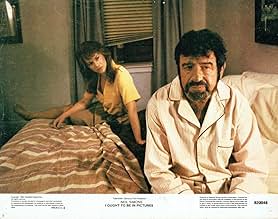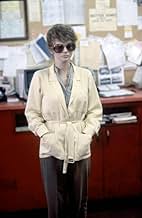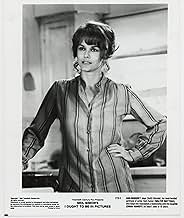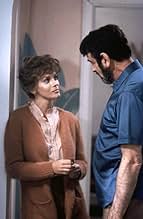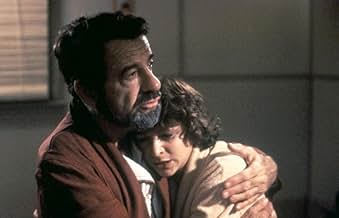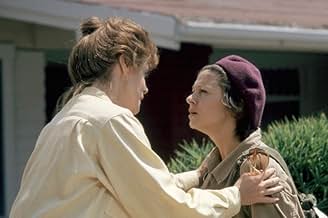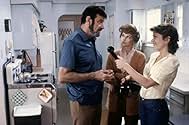NOTE IMDb
6,1/10
1,2 k
MA NOTE
Ajouter une intrigue dans votre langueBrooklynite Libby Tucker leaves her mother in Brooklyn to visit her screenwriter dad Herbert Tucker in L. A. She hasn't seen him for years and aspires to find a fast-paced life in movies. Al... Tout lireBrooklynite Libby Tucker leaves her mother in Brooklyn to visit her screenwriter dad Herbert Tucker in L. A. She hasn't seen him for years and aspires to find a fast-paced life in movies. Along the way, Libby discovers who her dad is.Brooklynite Libby Tucker leaves her mother in Brooklyn to visit her screenwriter dad Herbert Tucker in L. A. She hasn't seen him for years and aspires to find a fast-paced life in movies. Along the way, Libby discovers who her dad is.
Avis à la une
This is a modest but affecting little film. Besides his gift for one-line zingers, Neil Simon has a way of giving his characters lines that are both surprising and believable. Dinah Manoff is perhaps a bit abrasively cooky at first, but she moderates the Brooklyn shtick after awhile and comes over as more complex and real. Walter Matthau as her bewildered but finally disarmed dad is consummately believable. Ann Margaret has little to do, but she does it with superb subtlety. Just watch how well she listens and understands
10fiizzy
I just saw the movie. What a great movie it is. Very well written and very strongly performed. This movie basically has everything and teaches us how to combine a philosophical life with practical life. It shows us we might need the both and also more importantly the both ideas have their own values. All the performers did a great job in this. I thought it was great to look at the situation from this point of view. It is about how you want to build yourself not which is the right way of doing it. Great great movie. I feel bad for the person who wrote the comment as "the worst....". I think it is one of the best movies i have ever seen.
It must have been a casting no-brainer to put Dinah Manoff in the film-adaptation of Neil Simon's Broadway hit "I Ought To Be In Pictures" since she played the part of headstrong Libby on the stage. Unfortunately, a bombastic concoction such as Libby cannot be easily transferred to the more intimate medium of film, and the writing leaves both Manoff and the viewer at a complete loss. Neil Simon writes gag-dialogue, gag-characters, gag-situations, so when he tries to get serious--the audience doesn't know how to respond. Is this guy kidding again? Libby moves from Brooklyn to Los Angeles to reconnect with her estranged screenwriter father, ostensibly to break into movies but mostly because she needs a loving dad to hold her. These later scenes are so uncomfortable, so static, that poor Walter Matthau can only sit on the end of the bed and gape (I've never seen him at such a loss). Ann-Margret has a warm, grounded presence as Matthau's girlfriend (it's not much of a role, and the dialogue is still in Simon's one-note, but A-M manages to give this woman some soul). Manoff, looking and acting like a cross between Tatum O'Neal and Kristy McNichol, projects to the rafters, as if she were still on Broadway. She's Gussy Gumshun; and when the barriers come down and she's vulnerable, we would like to give her our sympathies, but Simon won't let us. He has already moved on, to the next limp gag. ** from ****
The problem with this film was that it was a rotten play to begin with. It's the same old Neil Simon characters, same old Neil Simon storylines. For Matthau, this is the same Neil Simon characterization as with his previous ventures into Simon's work. He's much better as Oscar in "The Odd Couple." Ann Margaret is entirely out of place here, but so is the writing and Herbert Ross's direction. Only Dinah Manoff, who reprises her Tony Award winning role, comes off successful in the picture.
Neil Simon's "I Ought to Be in Pictures" is a moving family drama, peppered with the author's patented gag lines and notable for sock performances by Dinah Manoff and Walter Matthau. Affecting, amusing interpersonal relationship pic bodes broad market appeal.,
Nimbly opened out from the 1980 stage version by helmer Herbert Ross (who also staged the play), film concerns a 19-year-old spunky Brooklyn girl Libby (Dinah Manoff reprising her stage role), who hitchhikes to New York to break into films as an actress but more importantly see her dad who left her, a brother and mom for good 16 years earlier. Dad is Herb Tucker (Walter Matthau fitted out with a handsome beard), a once-successful feature and tv scripter now given over to gambling and drinking. Tucker's loyal g.f. Steffie (Ann-Margret) is supportive but has her own children to take care of and a new boyfriend in the wings.
With Libby gradually insinuating herself into Herb's life and gradually reforming him (while cutely refurbishing his house and Mustang car), film gains its force from the powerful interplay of the duo's personalities. When the comical putdowns are replaced by genuine emotional (and physical) contact, Simon achieves his tear-jerking goal.
Key factor in making this work is apt casting, with Manoff, Lee Grant's sprig. Outstanding in avoiding direct sentimentality in the showy central role. She's also a good listener, with her eye contact and support of Matthau key elements. For his part, Matthau makes a ne'er-do-well character immensely sympathetic in spite of his shortcomings, enough so the viewer can root for these two to eventually come together in a loving fashion. Echoing the mother-daughter reconciliation of SImon's recent "Only When I Laugh", it builds to a valid denouement of Matthau geared up to plunge seriously into his writing assignments, and Manoff returning home with her family devils exorcised.
In a much smaller role, a deglamorized Ann-Margret is effective as the selfless mistress, while Martin Ferrero, Lewis Smith and Lance Guest provide a diveting scene apiece opposite Manoff. Tech credits, particularly Albert Brenner's production design and David M. Walsh's lighting, succeed in giving the film a realistic backdrop and avoiding a stagey or studio set look.
My review was written in March 1982 after a Midtown Manhattan screening.
With Libby gradually insinuating herself into Herb's life and gradually reforming him (while cutely refurbishing his house and Mustang car), film gains its force from the powerful interplay of the duo's personalities. When the comical putdowns are replaced by genuine emotional (and physical) contact, Simon achieves his tear-jerking goal.
Key factor in making this work is apt casting, with Manoff, Lee Grant's sprig. Outstanding in avoiding direct sentimentality in the showy central role. She's also a good listener, with her eye contact and support of Matthau key elements. For his part, Matthau makes a ne'er-do-well character immensely sympathetic in spite of his shortcomings, enough so the viewer can root for these two to eventually come together in a loving fashion. Echoing the mother-daughter reconciliation of SImon's recent "Only When I Laugh", it builds to a valid denouement of Matthau geared up to plunge seriously into his writing assignments, and Manoff returning home with her family devils exorcised.
In a much smaller role, a deglamorized Ann-Margret is effective as the selfless mistress, while Martin Ferrero, Lewis Smith and Lance Guest provide a diveting scene apiece opposite Manoff. Tech credits, particularly Albert Brenner's production design and David M. Walsh's lighting, succeed in giving the film a realistic backdrop and avoiding a stagey or studio set look.
My review was written in March 1982 after a Midtown Manhattan screening.
Le saviez-vous
- AnecdotesWalter Matthau once said of this movie: "It's filled with very real emotions . . . there were a few seconds while I was acting when I flashed back to my childhood when my father deserted us . . . I was exhausted at the end of each day. Some roles are easier but comedy, such as Neil Simon writes, is twenty times more difficult than straight acting or tragic acting. I prefer the challenge of comedy. It requires a great deal more energy, a great deal of kinetic output."
- GaffesIn the closing scenes Libby is first seen sitting on the left side of the bus talking to her seat mate, then when Herb drives his car up next to the bus on the right side she sees him through the right side window.
- Bandes originalesOne Hello
Music & Lyrics by Marvin Hamlisch and Carole Bayer Sager
Sung by Randy Crawford
Produced by Tommy LiPuma
(P) 1982 WEA International Inc.
Meilleurs choix
Connectez-vous pour évaluer et suivre la liste de favoris afin de recevoir des recommandations personnalisées
- How long is I Ought to Be in Pictures?Alimenté par Alexa
Détails
- Date de sortie
- Pays d’origine
- Langues
- Aussi connu sous le nom de
- I Ought to Be in Pictures
- Lieux de tournage
- 6830 Sunset Boulevard, Hollywood, Californie, États-Unis(motel Libby stays at upon arrival in Hollywood)
- Société de production
- Voir plus de crédits d'entreprise sur IMDbPro
Box-office
- Budget
- 10 500 000 $US (estimé)
- Montant brut aux États-Unis et au Canada
- 6 968 359 $US
- Week-end de sortie aux États-Unis et au Canada
- 2 170 397 $US
- 28 mars 1982
- Montant brut mondial
- 6 968 359 $US
Contribuer à cette page
Suggérer une modification ou ajouter du contenu manquant

Lacune principale
By what name was Je me fais du cinéma (1982) officially released in Canada in English?
Répondre

